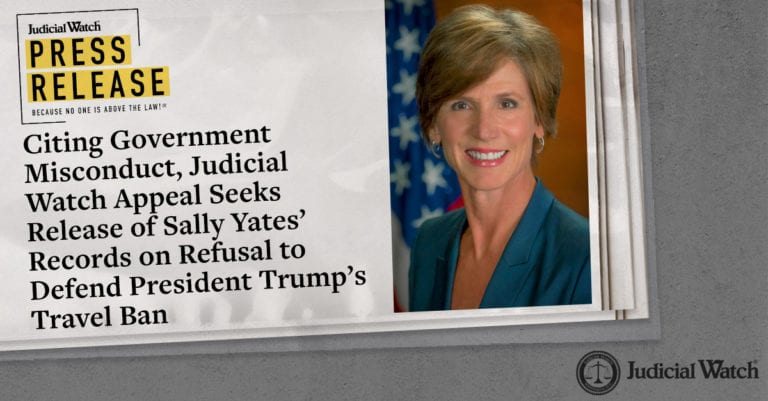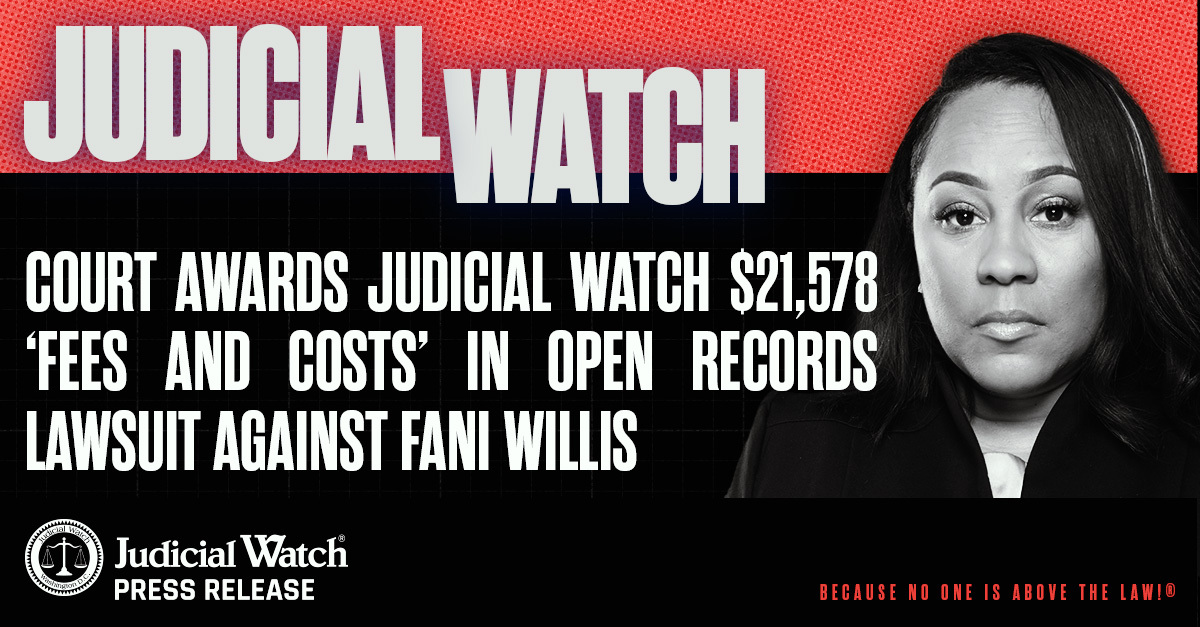

Citing Government Misconduct, Judicial Watch Appeal Seeks Release of Sally Yates’ Records on Refusal to Defend President Trump’s Travel Ban


(Washington, DC) – Judicial Watch announced today that it filed an appeal seeking the release from the Department of Justice of records from former Acting Attorney General Sally Yates related to her 2017 refusal to enforce President Donald Trump’s Middle East travel ban executive order. Judicial Watch argues that the documents are not shielded from disclosure, as the evidence of government misconduct by Yates.
At issue are four records described as “working drafts” of a January 30, 2017, statement by Yates instructing DOJ officials not to defend the executive order issued by then-President Trump. Trump fired Yates for insubordination after she issued the one-page statement.
The appeal concerns a May 2017 Freedom of Information Act (FOIA) lawsuit filed after the Justice Department failed to respond to a February FOIA request seeking Yates’ emails from her government account (Judicial Watch v. U.S. Department of Justice (No. 1:17-cv-00832)) for the time period she served as Acting Attorney General for President Trump. Judicial Watch recently filed the brief in the United States Court of Appeals for the District of Columbia (Judicial Watch vs. U.S. Department of Justice (No. 20-5304)).
The lower court ruled that the Justice Department could withhold the records under FOIA’s Exemption 5 “deliberative process privilege,” which is used to keep secret “pre-decisional” agency records.
Judicial Watch argues that the court has recognized “that government misconduct may overcome the deliberative process privilege.”
“[W]here there is reason to believe the documents sought may shed light on government misconduct, the privilege is routinely denied, on the grounds that shielding internal government deliberations in this context does not serve the public’s interest in honest, effective government.”
***
Insubordination, especially by an acting attorney general seeking to defy an executive order issued by the president, is a “serious breach of the responsibilities of representative government.” The records at issue relate directly to Yates’ defiance of the President and breach of the duties she owed the President, which resulted in her being fired. The records reflect, or at least are purported to reflect, the thought process by which Yates chose to direct her subordinates to defy the President by not defending the President’s executive order. They are, in effect, deliberations on Yates’ decision to commit insubordination. They do not warrant protection under the deliberative process privilege and should be made public.
The “working drafts” were sent as attachments in a chain of emails sent without messages between Yates and her deputy Matthew Axelrod.
Judicial Watch also highlights how the Justice Department is undermining the FOIA reforms passed into law Congress under the FOIA Improvements Act (FIA) in 2016 that “established a new, heightened standard of proof that agencies must meet when making discretionary withholdings of records requested under FOIA. Congress intended the FIA to shore up FOIA, not preserve a years-long, unsatisfactory status quo of ‘withhold-it-because-you-want-to’ exemptions and ‘knee-jerk secrecy.’”
“In an act of seditious and unethical conduct, Obama holdover Sally Yates sought to subvert then-President Trump by interfering with his lawful travel ban. That the Justice Department would try to cover up the details of this lawlessness is yet another scandal,” said Judicial Watch President Tom Fitton.
In 2017, Judicial Watch obtained records in this case that show strong support by Robert Mueller Deputy Andrew Weissmann and other top DOJ officials for Yates’ refusal to enforce President Trump’s travel ban. In one email Weissmann writes: “I am so proud. And in awe. Thank you so much. All my deepest respects.”
###















